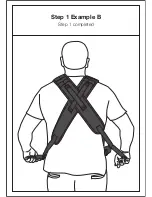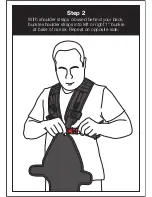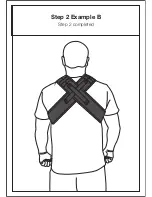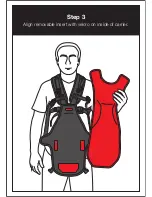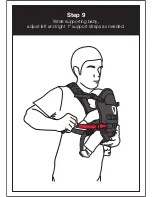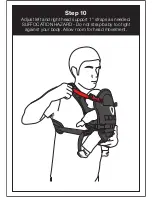
Step 1 Example A
Step 1 completed
FALL HAZARD
-
Infants can fall through a wide leg opening or out of baby
carrier.
- Hold your baby closely at all times until correctly attached.
- Make sure baby's legs are straddling the seat and arms
extend through arm holes.
- Adjust leg openings to fit baby's legs snugly.
- Before each use, make sure all buckles are secure.
- Take special care when leaning or walking.
- Never bend at waist; bend at knees.
- This baby carrier is designed for use by adults while walking
or standing only.
- Only use this baby carrier for children between 8 lb / 3.5 kg
(21 in/53 cm) and 33 lb/15 kg.
- Ensure proper placement of child in product including leg
placement.
- Your balance may be adversely affected by your own or your
child's movements.
- Never use a damaged baby carrier.
- This baby carrier must not be used as a back carrier.
SUFFOCATION HAZARD
-
Infants under 4 months can suffocate in product if face is
pressed tight against your body.
- Do not Strap baby too tight against your body.
- Allow room for head movement.
- Keep infant's face free from obstructions at all times.
- Never lie down or sleep with baby in the baby carrier.
- Inspect the baby carrier regularly for any signs of wear and
tear.
WARNING!
FALL AND SUFFOCATION HAZARD
Summary of Contents for BABY CARRIER
Page 1: ......
Page 2: ......
Page 5: ...Step 1 A Place shoulder straps overhead and securely onto shoulders...
Page 6: ...Step 1 B Place shoulder straps overhead and securely onto shoulders...
Page 7: ...Step 1 Example A Step 1 completed...
Page 8: ...Step 1 Example B Step 1 completed...
Page 10: ...Step 2 Example A Step 2 completed...
Page 11: ...Step 2 Example B Step 2 completed...
Page 12: ...Step 3 Align removable insert with velcro on inside of carrier...
Page 13: ...Step 3 Example A Step 3 Align velcro...
Page 14: ...Step 3 Example B Step 3 completed...
Page 15: ...Step 4 Buckle left or right side of the 1 buckles...
Page 16: ...Step 5 Holding baby securely against your chest guide one leg through the side you buckled...
Page 18: ...Step 6 While supporting baby with your arm buckle the other side s 1 buckle...
Page 19: ...Step 7 Continue to support baby s back as you buckle upper 1 buckles on left and right sides...
Page 21: ...Step 9 While supporting baby adjust left and right 1 support straps as needed...
Page 23: ...Step 10 Example A Adjusting straps...
Page 24: ...Step 11 Infants may require additional leg strap to reduce size of leg opening...
Page 25: ...Step 11 Example A Infants may require additional leg strap to reduce size of leg opening...
Page 26: ...Step 11 Example B Infants may require additional leg strap to reduce size of leg opening...
Page 27: ......








